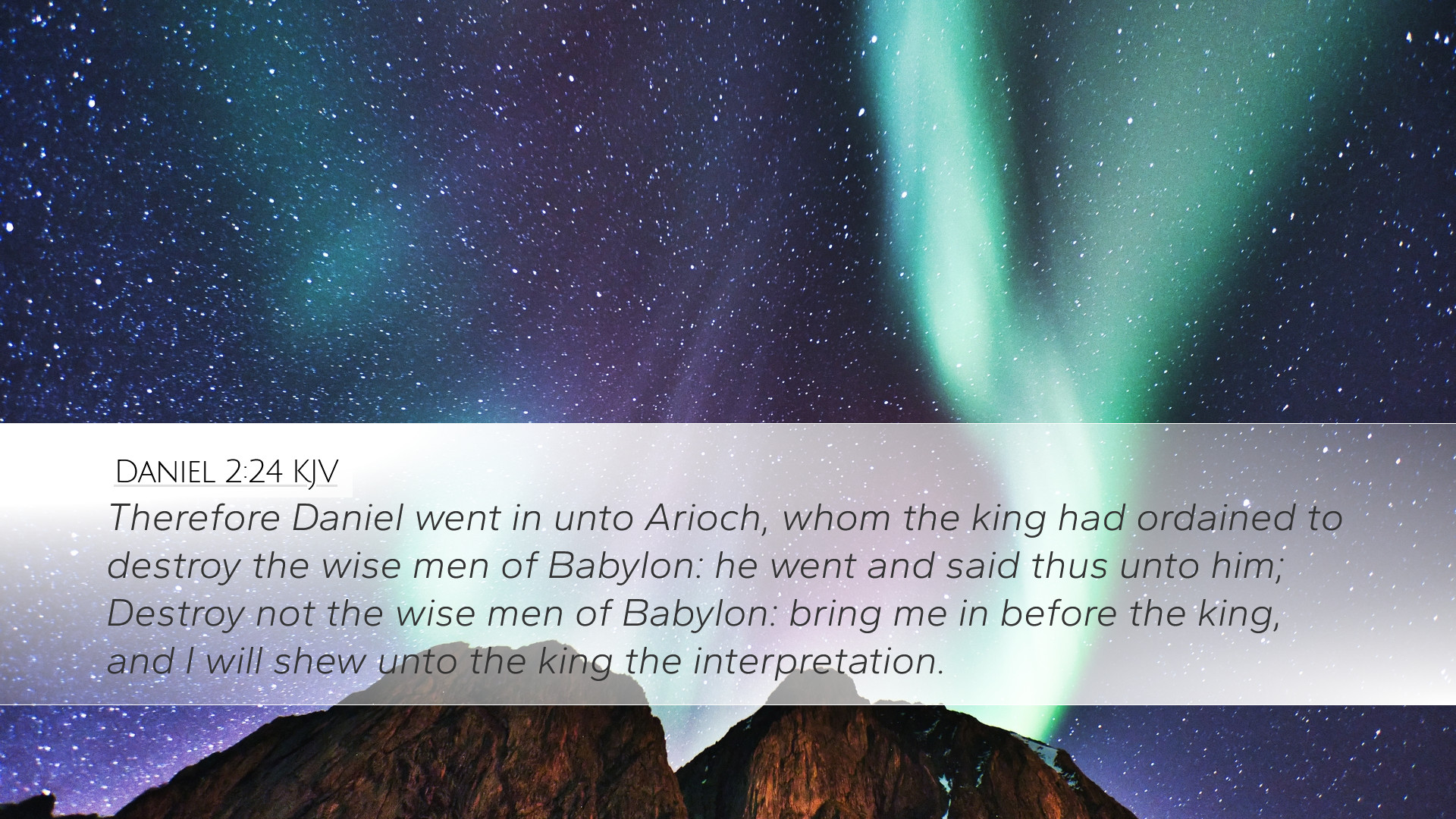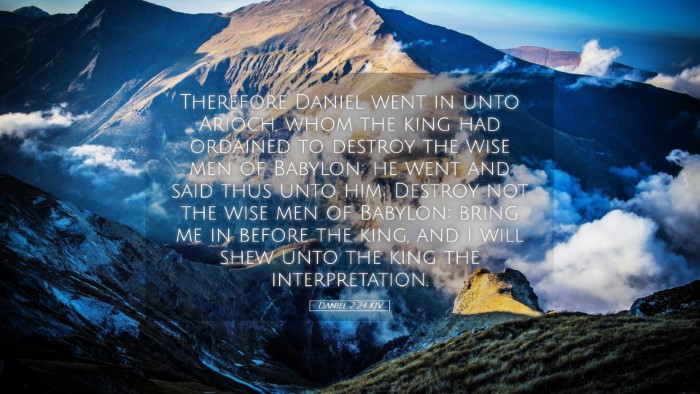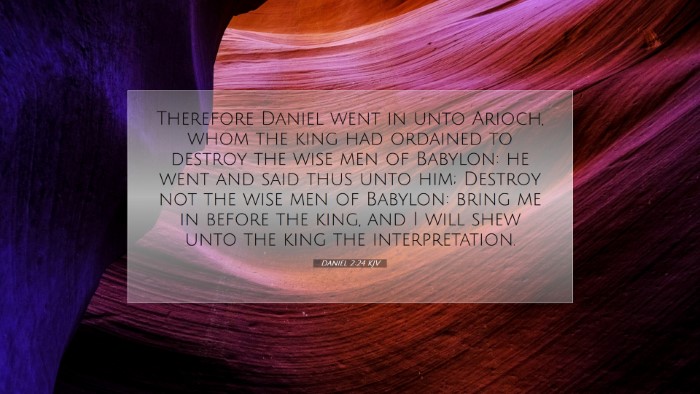Commentary on Daniel 2:24
Verse Reference: Daniel 2:24 - "Therefore Daniel went in unto Ariok, whom the king had ordained to destroy the wise men of Babylon: he went and said thus unto him; Destroy not the wise men of Babylon: bring me in before the king, and I will show unto the king the interpretation."
Introduction
The narrative in Daniel 2 centers around King Nebuchadnezzar’s troubling dreams and the consequent threat to the wise men of Babylon. Daniel’s intervention, as recorded in 2:24, emphasizes his role as a divinely appointed interpreter of dreams. This commentary synthesizes insights from esteemed public domain scholars such as Matthew Henry, Albert Barnes, and Adam Clarke to provide a comprehensive understanding of the verse.
Contextual Analysis
In the broader context, Daniel 2 addresses the sovereignty of God in revealing mysteries to His servants. Nebuchadnezzar’s dream presents a challenge to the wise men of Babylon, who are unable to disclose its content or interpretation. This situation drives the king to decree the execution of all wise men. Daniel, though initially not in the direct line of danger, steps forward to intercede on behalf of his peers.
Historical Context
Matthew Henry highlights the perilous atmosphere in Babylon, where the king’s edicts were enforced with severity. The wise men, often relied upon for counsel, find themselves in a precarious position that illustrates the frailty of human wisdom in contrast to divine understanding.
Verse Breakdown
- “Therefore Daniel went in unto Ariok…”
Daniel’s initiative signifies his courage and faith. Adam Clarke notes that he displayed remarkable composure and promptness in a crisis situation, which is indicative of his trust in God’s revelation.
- “…whom the king had ordained to destroy the wise men of Babylon:”
This detail underscores the urgency of the situation. Albert Barnes comments on the grave implications of Ariok’s role; the king had pronounced judgment without discernment. Daniel’s plea is not merely for himself but for the collective wisdom of Babylon.
- “he went and said thus unto him;”
Daniel's direct approach to Ariok illuminates his assertiveness. Henry suggests that this interaction reflects God’s sovereign hand in directing the course of events, allowing Daniel to assertively engage with the authorities.
- “Destroy not the wise men of Babylon:”
Daniel's compassion is evident here. Clarke remarks that it demonstrates true leadership; he advocates for those who are not innocent in the eyes of the king but recognizes their potential value. It emphasizes the importance of mercy and redemption.
- “bring me in before the king…”
His request to be brought before the king indicates a profound faith. Barnes emphasizes that Daniel did not shy away from the king’s wrath but approached him with confidence that God would give him the answer.
- “…and I will show unto the king the interpretation.”
This statement reveals Daniel’s assurance and prophetic calling. Henry draws attention to the courage it takes to make such a claim in front of a royal figure, confirming Daniel's role as a faithful witness to God’s power.
Theological Implications
Daniel’s actions in this verse serve as an embodiment of faith in God’s sovereignty over earthly kingdoms. The interplay of divine revelation and human responsibility is paramount throughout this passage. Scholars like Adam Clarke elaborate on how Daniel’s reliance on God contrasts sharply with the impotence of the Babylonian wise men, drawing attention to the overarching theme of divine wisdom versus human folly.
Divine Providence
Daniel’s intercession on behalf of the wise men illustrates God’s providential care. Barnes notes that God’s purpose often involves rescuing those who are undeserving as a testament to His grace. This aspect of divine mercy is central to understanding the nature of God’s dealings with humanity.
The Role of Prayer
In subsequent verses, it is revealed that Daniel sought God through prayer for wisdom. This highlights the necessity of prayer in the life of a believer, especially when faced with trials. Henry emphasizes that prayer invites divine intervention and insight, which is vividly portrayed in Daniel's response to the crisis.
Practical Conclusions for Believers
- Faithfulness in Crisis:
Daniel serves as a model for faithfulness in times of distress. His prompt action and reliance on God provide a blueprint for believers to follow when confronted with insurmountable challenges.
- Advocacy for Others:
Daniel's concern for the lives of the wise men exemplifies the call for believers to advocate for others, showing compassion in a world often driven by self-preservation.
- Trusting Divine Wisdom:
This verse illustrates the importance of trusting in God’s wisdom rather than human understanding. Clarke encourages believers to seek divine guidance through prayer in all decisions.
- Stepping Out in Faith:
Daniel’s initiative to approach Ariok and request an audience with the king demonstrates the need for boldness in faith. Barnes stresses that God rewards those who act in faith even amidst uncertainty.
Conclusion
Daniel 2:24 provides profound insights into the nature of faith, divine revelation, and the believer’s role in society. Combining the perspectives of Henry, Barnes, and Clarke enriches our understanding and application of this pivotal moment in Daniel's life. As ministers, students, and theologians delve into this passage, they find a compelling narrative of courage, compassion, and unwavering faith in God’s sovereignty.


